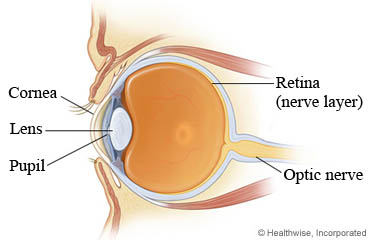
Your Recovery
You had a partial thickness corneal transplant (called DSAEK, DMEK, or DALK). It was done to remove a diseased, infected, or scarred part of the cornea. That part was replaced with healthy corneal tissue from a person who has died.
After your transplant, you may be told to lie on your back at times throughout the first few days. You may also need to sleep on your back. You will also need to wear an eye shield overnight. Then you will need to wear a clear eye shield or glasses to protect your eye until it has healed.
Your eye may feel irritated or scratchy for a few days after surgery. But it's important not to rub your eye. Rubbing your eye could damage it. Your vision may be blurry for a period of time after surgery. For some people, it may take 6 to 12 weeks to get the full benefits of surgery and to see as clearly as possible.
Your doctor will give you eyedrops to help your eye heal and prevent your body from rejecting the donor tissue. Use the drops exactly as directed. You will need to see your doctor often to have your vision checked.
You will probably be able to go back to work or your normal routine in about 1 to 2 weeks after surgery. But your vision will still be blurry. You will need to avoid heavy lifting for about 4 weeks, or until your doctor says it is okay.
This care sheet gives you a general idea about how long it will take for you to recover. But each person recovers at a different pace. Follow the steps below to get better as quickly as possible.
How can you care for yourself at home?
 Activity
Activity
- Ask your doctor when it is okay to drive.
- Wear your eye shield for as long as your doctor recommends.
- You can shower or wash your hair the day after surgery. Keep water, soap, shampoo, hair spray or hair dyes, and shaving lotion out of your eye.
- Do not rub or put pressure on your eye.
- Do not wear eye makeup until your doctor says it's okay. You may also want to avoid face cream or lotion.
- Avoid heavy lifting for about 4 weeks, or until your doctor says it is okay.
- Avoid swimming, hot tubs, gardening, and dusting for 2 to 4 weeks.
 Medicines
Medicines
- Your doctor will tell you if and when you can restart your medicines. He or she will also give you instructions about taking any new medicines.
- If you stopped taking aspirin or some other blood thinner, your doctor will tell you when to start taking it again.
- Follow your doctor's instructions for when to use your eyedrops. Always wash your hands before you put drops in. To put in eyedrops:
- Tilt your head back, and pull your lower eyelid down with one finger.
- Drop or squirt the medicine inside the lower lid.
- Close your eye for 30 to 60 seconds to let the drops or ointment move around.
- Do not touch the ointment or dropper tip to your eyelashes or any other surface.
- If the doctor gave you a prescription medicine for pain, take it as prescribed.
Follow-up care is a key part of your treatment and safety. Be sure to make and go to all appointments, and call your doctor if you are having problems. It's also a good idea to know your test results and keep a list of the medicines you take.
When should you call for help?
Call 911 anytime you think you may need emergency care. For example, call if:
- You passed out (lost consciousness).
- You have a sudden loss of vision.
- You have sudden chest pain, are short of breath, or cough up blood.
Call your doctor now or seek immediate medical care if:
- You have signs of an eye infection, such as:
- Pus or thick discharge coming from the eye.
- Redness or swelling around the eye.
- A fever.
- You have new or worse eye pain.
- You have vision changes.
- You have symptoms of a blood clot in your leg (called a deep vein thrombosis), such as:
- Pain in the calf, back of the knee, thigh, or groin.
- Redness and swelling in your leg or groin.
Watch closely for changes in your health, and be sure to contact your doctor if:
- You do not get better as expected.
Where can you learn more?
Go to http://www.healthwise.net/patientEd
Enter G352 in the search box to learn more about "Corneal Transplant (Partial Thickness): What to Expect at Home".
Current as of: July 31, 2024
Author: Ignite Healthwise, LLC Staff
Clinical Review Board
All Ignite Healthwise, LLC education is reviewed by a team that includes physicians, nurses, advanced practitioners, registered dieticians, and other healthcare professionals.

